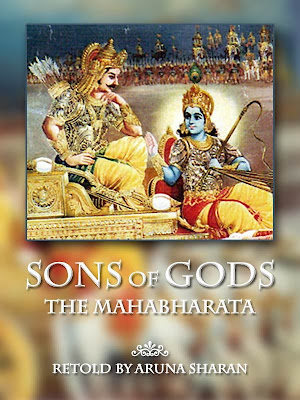Myths of Mankind: The Mahabharata, Part Five
Destiny and Free Will: is Paradise open to dogs? (watch the video below for the answer!)
“'You must learn to see with the same eye a mound of earth, a heap of gold, a cow, a sage, a dog, and the man who eats the dog. There’s another intelligence beyond the mind.' Krishna in Peter Brook’s Mahabharata.
'Dharma belies the Western criticism of Hindu thought: that it leaves precious little room for free will, that it binds man upon a wheel of fate, a wheel of reincarnation, rebirth; a wheel that goes round and round and round and round and round.
'Dharma offers the escape from the fate of reincarnation; it is the path detached from this world of illusion, to the quintessential truth which Hinduism seeks.
“'From a western point of view it’s impossible to understand that fate, destiny and free will can coexist. Everything in the western mind says if there is fate there isn’t free will, if there’s free will there can’t be such a things as fate or destiny. The Mahabharata cuts that away and puts one in front of something very different, in that freedom exists in a quite different way and that one sees that the great freedom for each character is either to become himself or not to become himself.' Peter Brook, director, The Mahabharata.
It is with this detachment that Arjuna can sound the horn even for the horrors of the coming war. The Pandavas win eventually, but it is a victory that is to deeply trouble them.
"'Every rule is broken. Every single value is destroyed there is no difference left between the people who are good and the people who are evil; there is no difference left between who is the enemy and who is not.' Mallika Sarabhai.
No one can calm the sense of wrongfulness in the mind of Yudhisthira, now king.
“That one work can contain both so much wisdom and entertainment after several millennia is mind boggling and without comparison. If Homer’s Iliad could also contain the New Testament and was as popular today as it was 2000 years ago, even this would not compare with the poem attributed to Vyasa. By comparison Shakespeare himself seems like a lightweight, and indeed, all literary fame pales.
“We find it hard to believe that anything of such magnificence could be a legacy from a time before history began, but in the West our scholars have looked for the cradles of civilisation closer to home. To us India is a mere footnote to history. We require hard evidence, documents, records. And unlike Egypt or Mesopotamia where nothing will decay the Indian climate ensures than nothing, not even the hardest stone carvings, will survive much beyond one millennium.
“But could we be wrong? Instead of a footnote, should India be one of the main chapters of the history books?”



Comments